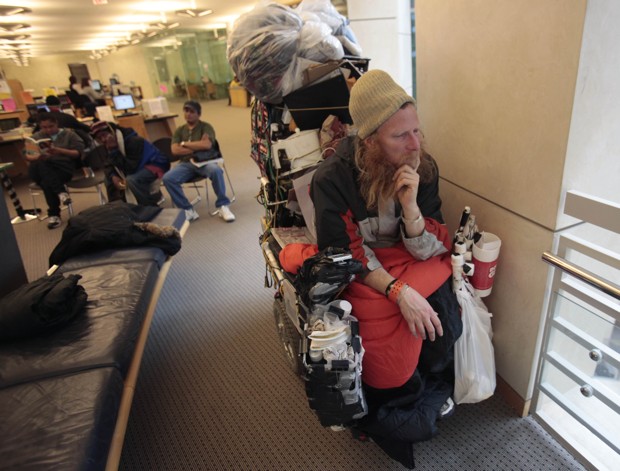By Juli Fraga
March 29, 2016
A homeless man sits on the steps of the San Francisco Public Library.
(AP Photo/Marcio Jose Sanchez)
On this particular rainy morning, she’s hoping to find her client, John, who suffers from depression and is in need of mental health care and temporary housing. Esguerra is excited to tell John that she’s arranged some resources like food stamps and made an appointment for him to meet with a psychiatrist who will help treat his depression.
John is one of more than 7,000 homeless people living in San Francisco. Each day, hundreds of the city's homeless take refuge at the library, where they find shelter from the rain and a daytime roof over their heads.
A 2015 survey of San Francisco’s homeless population found that 67 percent reported chronic health conditions, from physical disabilities and HIV/AIDS to psychiatric illnesses such as schizophrenia, bipolar disorder, and major depression. People with untreated psychiatric disorders may pose a danger to the public or themselves. A 2014 investigation by KQED discovered that more than half of the residents shot by the police between 2005-2013 were mentally ill.
At the library, Esguerra recognizes at-risk patrons when she sees them talking to themselves or pacing back and forth between the bookshelves. This is how Esguerra met Henry seven years ago.
After his son died unexpectedly, Henry became depressed and began abusing alcohol to help ease his pain. Eventually, he lost his job and home and spent nine months living on the streets, sleeping underneath a bridge on Division Street. Meeting Esguerra at the library, however, helped him turn his life around.
Esguerra introduced Henry to the Homeless Outreach Team (HOT), and they found him subsidized housing. They also connected him with mental health services so that he could begin counseling.
Henry still spends his days at the library, but now he’s a Health and Safety Associate (HASA) worker, and Esguerra is his boss. As a HASA worker, Henry’s job is to help the homeless patrons find the resources they need to get back on their feet. "The homeless feel safe talking to me because I tell them that I've been there, too,” Henry says. Esguerra has five HASA workers on her team—all of them are formerly homeless.
“I feel authentic compassion for the people I’m trying to help,” adds Henry. “I believe this goes a long way because they know I am not faking it, and they feel comfortable opening up to me.”
A homeless man named John sits in his wheelchair inside the library. (AP Photo/Marcio Jose Sanchez)
Not long ago, Esguerra met a woman named Sally at the library. Sally used to work as a nurse at a hospital in San Francisco. After witnessing a co-worker commit suicide, Sally suffered from Post-Traumatic Stress Disorder (PTSD) and was unable to continue working. Eventually, she became homeless, and while she was living on the streets, she saw a stabbing, which worsened her PTSD.
By the time she met Esguerra, Sally felt hopeless. She worried about the prospect of finding a new job in her 50’s. Esguerra recalls her saying, “I’m back to square one.” Esguerra helped Sally find mental health care, food stamps, and job training. Henry took Sally under his wing, too. He helped her navigate the community resources that Esguerra had put in place and reassured her that he understood what she was going through.
Today, Sally lives in subsidized housing, and she is working again. She still visits Esguerra and the HASA outreach workers at the library. “This team became my family,” says Sally. “At one time, the library was my home.”
Esguerra says that the program dismantles stereotypes about homelessness. Over the years, she's helped former restaurant owners, medical professionals, and senior citizens find housing and she's connected close to 1,000 people with community resources such as legal services and medical and mental health care. The program is so successful that this year it will expand to other library branches in the city.
The program also began a national trend. Today, twenty-four public libraries in the country have followed in San Francisco's footsteps. The Dallas Public Library implemented a peer-counseling model, and the Pima County Public Library in Tucson, Arizona hired a nurse to provide medical care for the homeless population.
In the end, these social service programs serve as a bridge, helping the homeless patrons find a sense of community at the library so that they can receive other essential resources, too.
“These programs are humanizing homelessness throughout the library,” says Esguerra. “The library becomes a sanctuary for many of the patrons and our program helps them to feel safe again.”
Source: The Atlantic CITYLAB


No comments:
Post a Comment